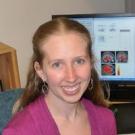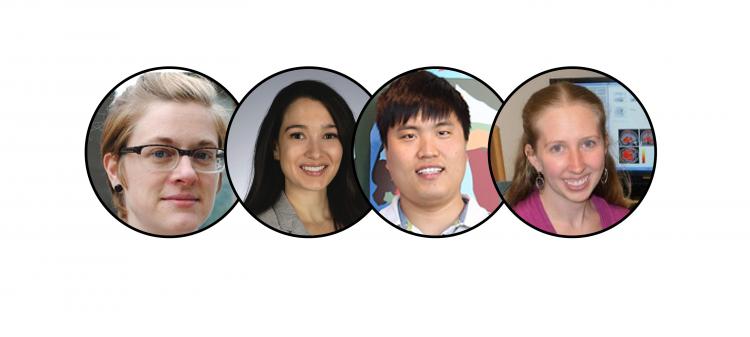Learn about the newly funded 2021-2022 ADRC Development Projects. These awards encourage investigators to use ADRC resources to advance the understanding, diagnosis, or treatment of Alzheimer’s disease.
Brain glycan sulfation recoding in Alzheimer's disease
Kimberly Alonge, PhD. Acting Instructor, UW Medicine

The brain's extracellular matrix is a three-dimensional network consisting of macromolecules and minerals that provide structural and biochemical support to surrounding brain cells. Recent research, including Dr. Alonge's previous work, shows that Alzheimer's disease leads to losses of important structures within this matrix, called 'perineuronal nets', that normally help to maintain the integrity of brain circuits involved in memory and cognition.
In this new ADRC-funded project, Dr. Kimberly Alonge will leverage ADRC resources to identify neuropathological mechanisms behind changes in the extracellular matrix in both postmortem human brain tissue and in pre-clinical rodent models of Alzheimer's disease.
Dr. Alonge will extend her previous work with mass spectrometry technology to quantify biological changes in brain tissue. She will rely on the UW School of Pharmacy's Mass Spectrometry Center to analyze samples from the carefully curated human brain tissue resources of the UW ADRC Precision Neuropathology Core. She will also continue her ongoing work with ADRC's Brian Kraemer, PhD, to determine whether loss of perineuronal nets in a rodent model of Alzheimer's disease associates with disease progression. Through these resources, this award will help Dr. Alonge advance our knowledge of neurodegenerative disease pathophysiology.

Understanding microglia responses in resilience, cognitive decline, and neuropathological proteopathy
Katherine Prater, PhD. Postdoctoral Research Fellow (Jayadev Lab), Department of Neurology, UW Medicine

Microglia, the immune cells of the brain, normally orchestrate protective inflammatory responses. On the flipside, evidence shows that neuroinflammation is a key driver of Alzheimer's disease pathology. In the Jayadev Lab, Dr. Katherine Prater studies how the brain's immune sentinels respond to the presence of Alzheimer's disease pathology, particularly in individuals who were resilient to Alzheimer's disease during life. "Resilience" refers to the subset of individuals who live until late life without developing symptoms of dementia , yet who show relatively high levels of Alzheimer’s disease neuropathology in their brains at post-mortem autopsy. These individuals seem to have overcome the presence of pathological proteins such as amyloid beta and tau and remain cognitively normal despite pathology-and may hold clues to the biological mechanisms of resilience.
In this new ADRC project, Dr. Prater will investigate the gene expression and immune activation profiles of microglia from autopsy specimens from resilient individuals and from those who had dementia during life. This study aims to reveal how neuroinflammation differs between individuals who do and do not show resilience to Alzheimer's disease, providing a starting point from which to assess the potential for new pharmacological targets.
ADRC resources play a key role in this development project, which leverages human tissue samples from the ADRC Precision Neuropathology Core, matching clinical data from ADRC Clinical Core, and expertise from the ADRC Data Management and Statistics Core.

Plasma phosphorylated tau protein and Alzheimer's disease in American Indians: The Strong Heart Study
Astrid Suchy-Dicey, PhD. Assistant Professor, Elson S. Floyd College of Medicine, Washington State University
Dr. Astrid Suchy-Dicey is interested in furthering innovative research that focuses on detecting and accurately diagnosing Alzheimerʼs disease and related dementias in American Indian communities. Because rural American Indian reservations have limited access to specialty neurology care centers, these communities would greatly benefit from non-invasive, low-cost, efficient diagnostic tools that use relatively basic laboratory technologies. One newly available option in this regard is a blood test for tau, a hallmark protein pathology of Alzheimer's disease.
Recent research shows that measures of a certain form of abnormal tau protein (p-tau181) can serve as a potential blood plasma biomarker test for Alzheimer’s disease and other dementia pathologies. P-tau181 correlates closely with multiple markers of disease severity and symptom profile, and it can distinguish patients from healthy controls with high precision. This ADRC-funded pilot project will conduct the first measures of p-tau181 in American Indian elders using stored blood plasma samples from the Strong Heart Study. This study conducted MRI brain scans, cognitive testing, clinical evaluation, and collected blood plasma in a cohort of American Indian elders in Oklahoma, South Dakota, and Arizona over the last decade.
Dr. Suchy-Dicey will determine the extent to which p-tau181 plasma assays distinguish Alzheimerʼs dementia from normal cognitive aging in American Indians. She will also examine associations of p-tau181 plasma assays with previously-collected MRI volumetric brain imaging measures. This pilot study will explore the feasibility of using these tau assays for biomarker measurement in larger studies in this unique population.
Along with the valuable data from the Strong Heart Study, this project leverages ADRC resources in the form of mentor expertise as well as the use of existing ADRC data.

Using metabolic network modeling to improve the maturity of iPSC-derived microglia for Alzheimer's disease
Yuliang Wang, PhD. Research Assistant Professor, Paul Allen School of Computer Science and Engineering/Institute for Stem Cell & Regenerative Medicine, University of Washington
Researchers in the UW ADRC Neuropathology Stem Cell component can generate living microglia from patient-derived Induced pluripotent stem cells. These cells hold great promise for modeling Alzheimer's disease and testing the effect of potential therapeutics. Computer scientist Dr. Yuliang Wang aims to tackle a major roadblock in stem cell research: Derived microglia act like fetal immature microglia, which may pose significant challenges for modeling Alzheimer's disease, an adult-onset disease that develops with age.
In this ADRC-funded project, Dr. Wang will develop and validate a computational method to identify metabolic interventions that will enhance the maturity and function of stem cell derived microglia, in order to accurately model neuroinflammation in Alzheimer's disease in a dish. This project is a close collaboration with the UW ADRC's Suman Jayadev, MD, and Jessica Young, PhD. The team will generate microglia from patient-derived stem cell lines and measure the characteristics of the cells before and after testing the metabolic interventions predicted to be most promising by the new computational model.
This project will introduce new ways to identify metabolites and enzymes important for microglia maturation, validating their function in vitro systems, and producing more mature and functional derived microglia for modeling neuroinflammation in Alzheimer's disease.





